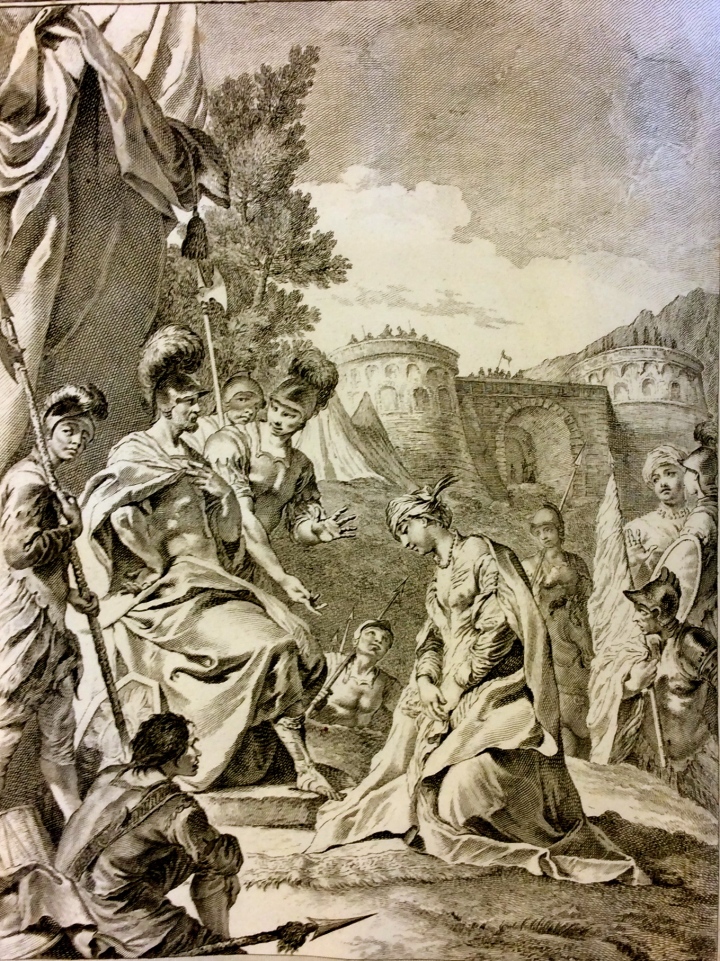Month: March 2015
Formidable Armida (Part One)
Standard
Armida petitions Godfrey to redress the injustice done to her – but in fact she plots the destruction of his army. Illustration of Gierusalemme Liberata (Venice 1745) by Giambatista Piazzetta. Sp Coll Hunterian Cd.2.1., Special Collections, University of Glasgow Library.
Do not be fooled by the meek expression and the posture of submission. This is a very dangerous woman!
Each darkest trick, each subtlest blandishment
a woman or a witch can ply she knows. (4.23)
Armida is powerful, combining beauty (the greatest in ‘all the Orient’), intelligence, and the art of witchcraft. Her uncle, Hydraoth, a sorcerer himself and lord of Damascus, recognizes her extraordinary talents when he says:
My darling girl, who know the art / to make blond hair and sweet looks hide a wit / sharp as a greybeard’s and a mannish heart. / In sorcery you’re my better. (4.24)
But the crusading soldiers cannot see the hidden intelligence. They only have eyes for her beauty and are struck by her sexual allure, which is expressed in no uncertain terms, verging on soft pornography (for the sixteenth century, at least):
Her beauteous breast displays its naked snows
that feed love’s flame that they themselves have brought.
Partly her budding unsucked bosom shows,
partly lies hid, in envious garments caught –
envious, yes, – but though all paths they close
to sight, they cannot quite bar amorous thought,
that, not content with outward beauties, traces
an inward path to hidden, secret places. (4.31)
The ‘lustful’ crowd surrounds Armida as she visits Godfrey to play the damsel in distress. She spins a woeful tale of hardship and injustice done to her by her ‘guardian,’ who supposedly stole her fortune and tried to force her to marry his son. But it is all part of an evil plan hatched between Armida and her uncle, Hydraoth, aiming to destroy the Christian army. And she, ultimate actress, ‘gives no sign how her heart laughs to abide / her certain triumph and its spoils’ (4.33), but plays her game to the end, and partly succeeds in her aim. Eustace, Godfrey’s younger brother, falls madly in love with her, and so do dozens of other Christians, who are ready to abandon the camp and go to her aid.
But Godfrey is suspicious and cannot wholly believe her story. He promises to help her get her fortune and throne back after the crusaders have taken Jerusalem. Armida bursts into tears and threatens to kill herself. The gallant Eustace and other men are angry with Godfrey and promise to help her.
Beauty in tears – when will it not succeed?
Or speech on an amorous tongue, meltingly sweet? (4.83)
The seeds of discord are sown in the Christian camp. So far, Armida’s plan is going well.
And now, since she sees smiling Fortune greet
this great commencement of her wiles, she starts,
before her plot can weaken, to complete
her criminal design upon their hearts,
to gain by her fair looks and gestures sweet
more than Medea or Circe by their arts. (4.86)
Like her powerful predecessors of Classical mythology, Medea and Circe, Armida has criminal designs, and in spite of Godfrey’s resistance, she means to carry out her plan to the end. But the names of those two witches also ring a bell of warning: both Medea and Circe fell in love with men they initially wanted to destroy, and both payed for it, more or less…
What will be Armida’s next move?
(to be continued)